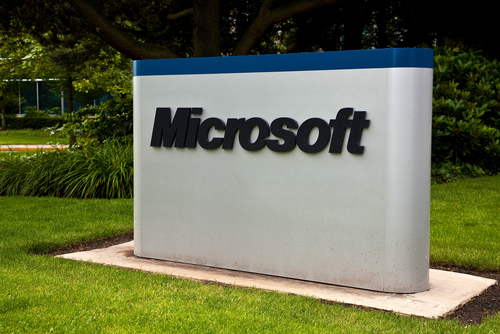Microsoft Profits From Strong Enterprise Demand

Microsoft reports better than results as strong enterprise demand delivers record sales
Microsoft has pleased Wall Street after delivering a strong set of financials in the second quarter of its 2014 fiscal year.
Redmond beat analyst expectations after it reported earnings of $0.78 (£0.47) per share on profits of $6.56 billion (£3.9bn). Even more good news followed as the company generated $24.52 billion (£14.7bn) in sales for the quarter ending 31 December.
Financial analysts had expected the company to book $23.68 billion (£14.2bn) in revenue and earnings of $0.69 (£0.42) per share.
Business Demand
Microsoft CEO Steve Ballmer credited the company’s record haul on strong demand from businesses for the company’s enterprise products and healthy adoption of its consumer products during the holidays. “Our Commercial segment continues to outpace the overall market, and our Devices and Consumer segment had a great holiday quarter,” he said in a statement.
“The investments we are making in devices and services that deliver high-value experiences to our customers and the work we are doing with our partners are driving strong results and positioning us well for long-term growth,” added the soon-to-retire CEO.
The software giant reported that revenue in its Commercial segment jumped 10 percent to $12.67 billion (£7.6bn), compared with the same year-ago quarter. SQL Server and System Center both experienced double-digit growth, while Office 365 commercial seats and Azure’s customer base both surged by more than 100 percent, according to the company.
“We significantly outpaced enterprise IT spend as we continue to take share from our competitors by delivering the devices and services our customers need as they transition to the cloud,” said Kevin Turner, Microsoft’s chief operating officer. Revenue from its “commercial cloud services more than doubled,” claimed Microsoft.
“Our commercial cloud services revenue grew more than 100 percent year-over-year, as customers are embracing Office 365, Azure and Dynamics CRM Online, and making long-term commitments to the Microsoft platform,” added Turner.
During a conference call concerning Microsoft’s financials, CFO Amy Hood said her company continues “to deliver on our differentiated cloud strategy.”
 Windows Issues
Windows Issues
The picture is a little murkier for the company’s flagship Windows operating system. “Windows Pro revenue grew 12 percent and outpaced the underlying PC market,” said Hood, indicating that adoption among businesses is improving. Consumer demand is plummeting, however. Revenues of “non-Pro” flavors of the OS were down 20 percent, she said.
Nonetheless, the company’s Devices and Consumer segment saw a 13 percent boost in sales, year-over-year, to $11.91 billion (£7.2bn). Surface revenue shot up to $893 million (£537m) in the second quarter from $400 million (£241m) the previous quarter. Soon, Nokia’s handset unit may contribute to those figures.
Although the Nokia acquisition hit somewhat of a snag in China, Hood said the process is on track. Microsoft continues “to expect that the deal will close this quarter,” she said.
The company also reported strong sales of 3.9 million Xbox Ones and 3.5 million Xbox 360 consoles. Bing’s share of Web searches hit 18.2 percent during the quarter, and search advertising revenue posted a 34 percent gain.
Is Microsoft Office your friend? Take our quiz!
Originally published on eWeek.
